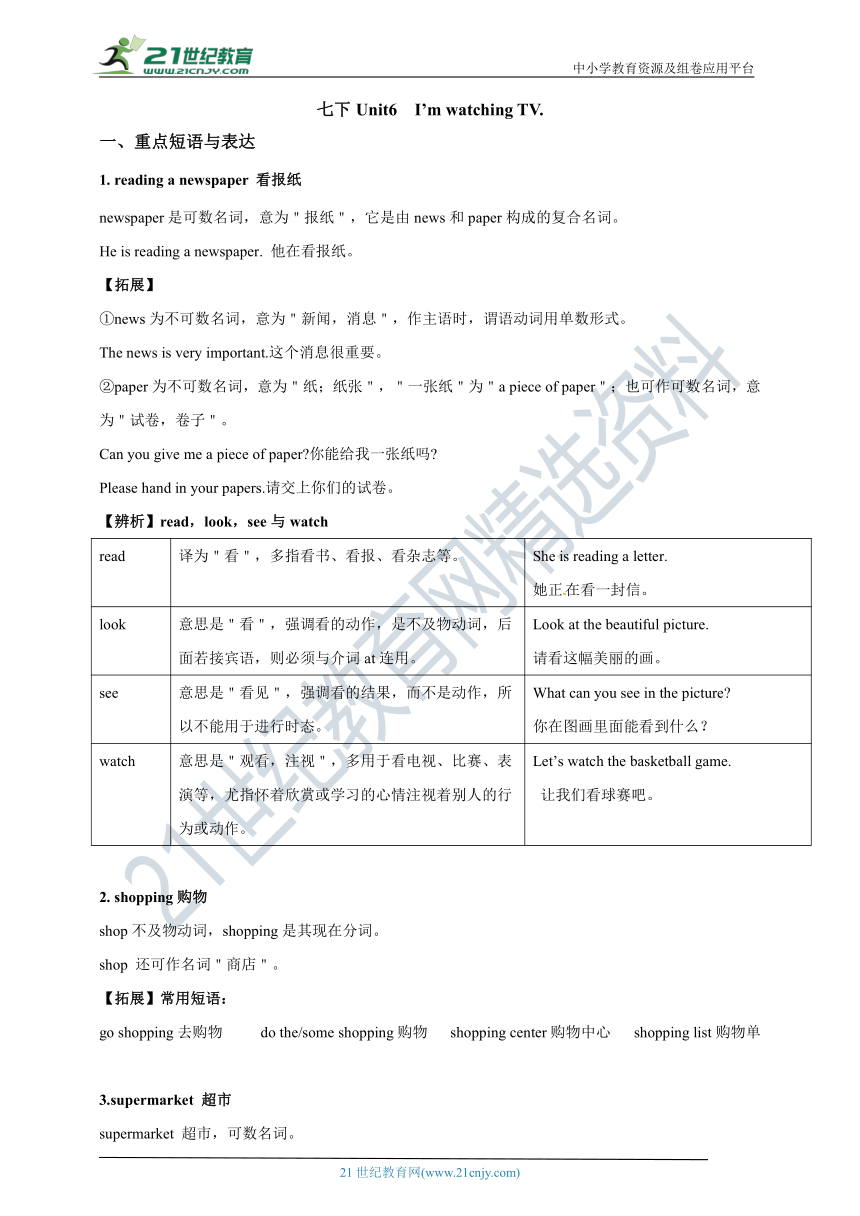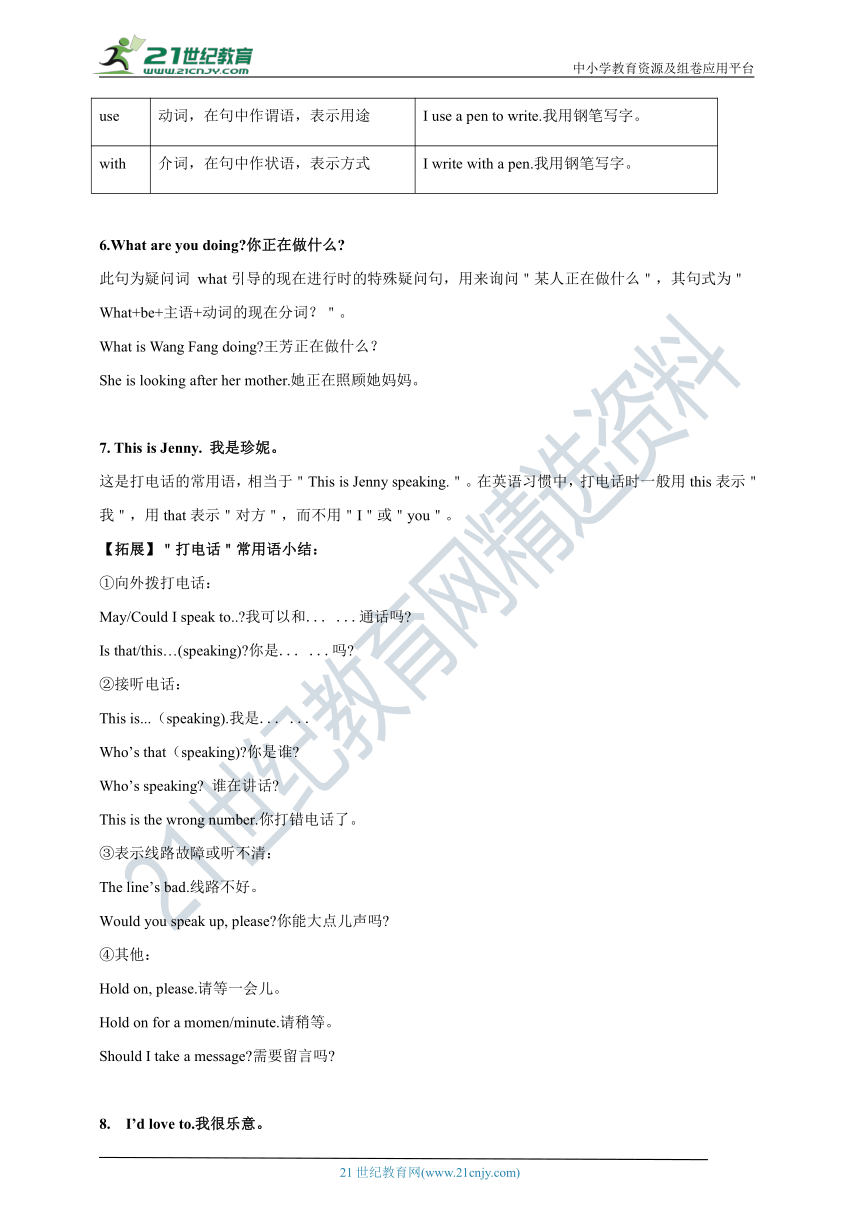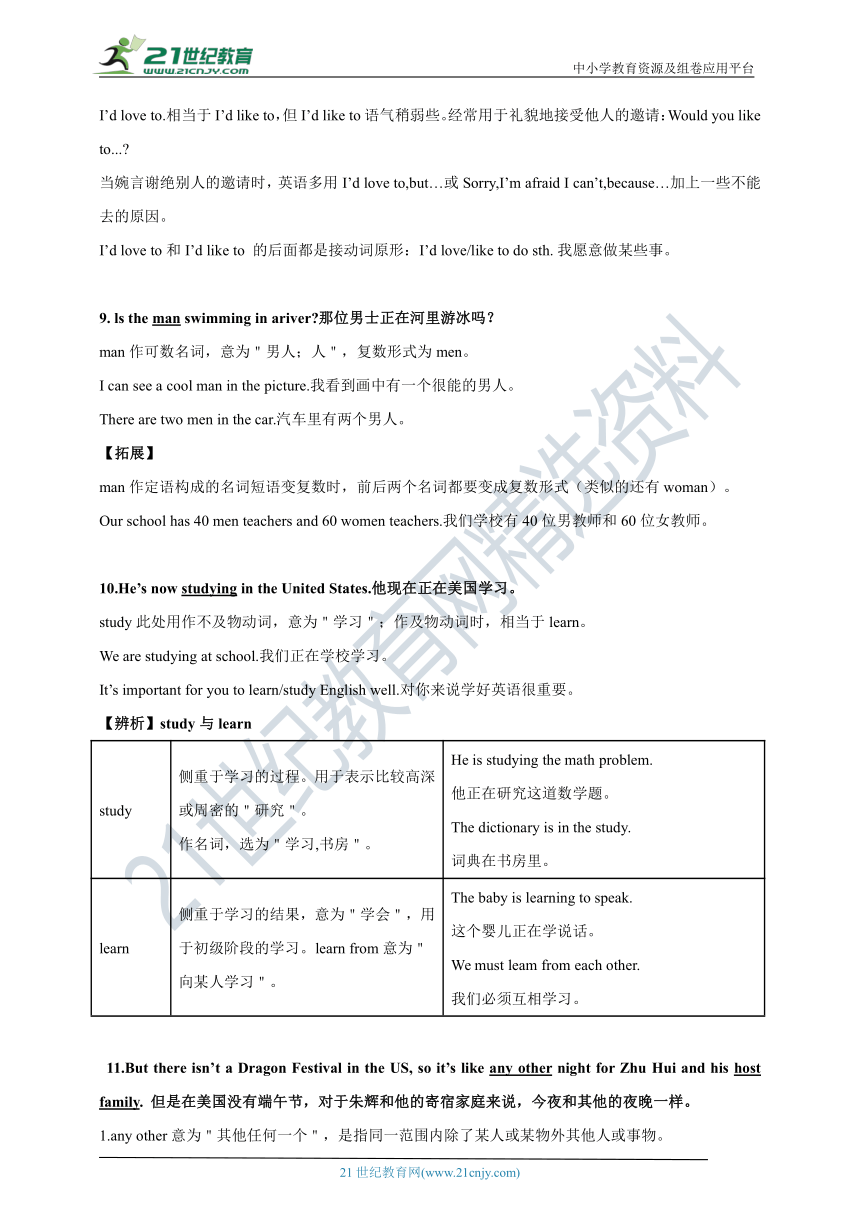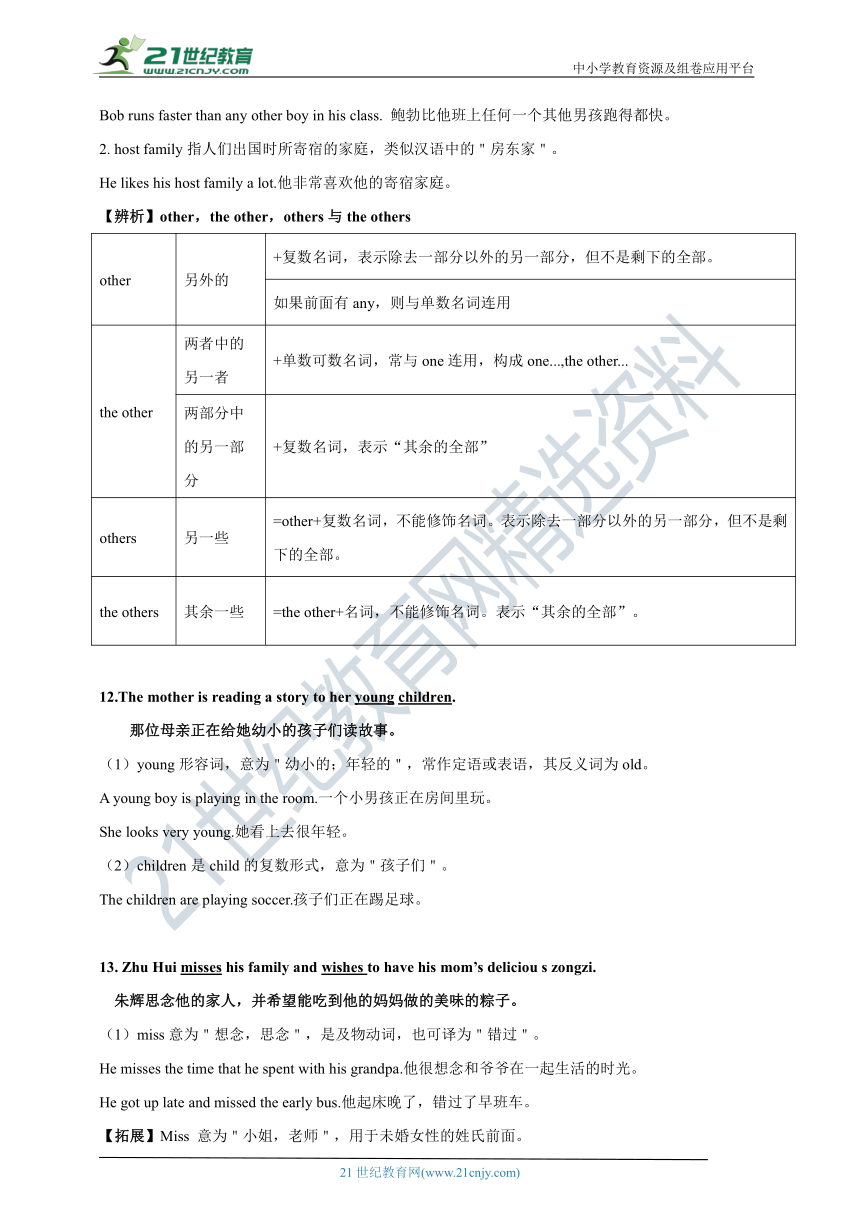Unit6 I’m watching TV.同步导学精炼(知识点和语法点汇总)
文档属性
| 名称 | Unit6 I’m watching TV.同步导学精炼(知识点和语法点汇总) |

|
|
| 格式 | zip | ||
| 文件大小 | 1.3MB | ||
| 资源类型 | 试卷 | ||
| 版本资源 | 人教新目标(Go for it)版 | ||
| 科目 | 英语 | ||
| 更新时间 | 2021-03-08 21:52:56 | ||
图片预览





文档简介
中小学教育资源及组卷应用平台
七下Unit6
I’m
watching
TV.
一、重点短语与表达
1.
reading
a
newspaper
看报纸
newspaper是可数名词,意为"报纸",它是由news和paper构成的复合名词。
He
is
reading
a
newspaper.
他在看报纸。
【拓展】
①news为不可数名词,意为"新闻,消息",作主语时,谓语动词用单数形式。
The
news
is
very
important.这个消息很重要。
②paper为不可数名词,意为"纸;纸张","一张纸"为"a
piece
of
paper";也可作可数名词,意为"试卷,卷子"。
Can
you
give
me
a
piece
of
paper?你能给我一张纸吗?
Please
hand
in
your
papers.请交上你们的试卷。
【辨析】read,look,see与watch
read
译为"看",多指看书、看报、看杂志等。
She
is
reading
a
letter.她正在看一封信。
look
意思是"看",强调看的动作,是不及物动词,后面若接宾语,则必须与介词at连用。
Look
at
the
beautiful
picture.
请看这幅美丽的画。
see
意思是"看见",强调看的结果,而不是动作,所以不能用于进行时态。
What
can
you
see
in
the
picture?
你在图画里面能看到什么?
watch
意思是"观看,注视",多用于看电视、比赛、表演等,尤指怀着欣赏或学习的心情注视着别人的行为或动作。
Let’s
watch
the
basketball
game.
让我们看球赛吧。
2.
shopping购物
shop不及物动词,shopping是其现在分词。
shop
还可作名词"商店"。
【拓展】常用短语:
go
shopping去购物
do
the/some
shopping购物
shopping
center购物中心
shopping
list购物单
3.supermarket
超市
supermarket
超市,可数名词。
【辨析】supermarket,store与shop
1.
supermarket
指自选市场,比store与shop经营规模大,经营时间长。
2.
store与shop
作名词时,均有"商店,商场"之意,可通用。美国人常用store,英国人常用shop。
3.
store与shop作动词时,分别意为"贮藏"和"购物"。
4.
talking
on
the
phone
通电话
on
the
phone意为"通过电话",其中on为介词,意为"通过;以……的方式"。
on
TV意为"通过电视"。
He
is
talking
on
the
phone.他正在打电话。
He
is
working
on
the
computer.他正用电脑工作。
Jenny
is
listening
to
the
news
on
the
radio.珍妮正在用收音机听新闻。
【拓展】
1.
phone此处用作名词,相当于telephone,意为"电话",与phone有关的短语有:
make
a
phone
打电话;answer
the
phone
接电话;phone
number电话号码;phone
book电话簿。
Can
you
tell
me
your
phone
number?你能告诉我你的电话号码吗?
2.
phone还可用作动词,意为"打电话"。phone
sb.意为"给某人打电话"。
I
phone
my
mother
once
a
week.我一周给妈妈打一次电话。
5.
use
use此处用作及物动词,意为"使用;运用"
常用结构:use?sth."使用某物"
use?sth.to
do?sth."用某物做某事"
May?I?use?your?phone?我可以用一下你的电话吗?
Iuse?a?knife?to?cut?bread.我用刀切面包。
【拓展】
①use还可作名词,意为"用途;用法"。
The
computer
has
many
uses.电脑有许多用途。
②
useful形容词,意为"有用的",可作定语或表语。
English
is
useful
for
you.英语对你来说是有用的。
That
is
a
useful
book.那是一本有用的书。
【辨析】use与with
use
动词,在句中作谓语,表示用途
I?use?a?pen?to?write.我用钢笔写字。
with?
介词,在句中作状语,表示方式
I
write?with?a?pen.我用钢笔写字。
6.What
are
you
doing?你正在做什么?
此句为疑问词
what引导的现在进行时的特殊疑问句,用来询问"某人正在做什么",其句式为"What+be+主语+动词的现在分词?"。
What
is
Wang
Fang
doing?王芳正在做什么?
She
is
looking
after
her
mother.她正在照顾她妈妈。
7.
This
is
Jenny.
我是珍妮。
这是打电话的常用语,相当于"This?is?Jenny?speaking."。在英语习惯中,打电话时一般用this表示"我",用that表示"对方",而不用"I"或"you"。
【拓展】"打电话"常用语小结:
①向外拨打电话:
May/Could?I?speak?to..?我可以和...
...通话吗?
Is?that/this…(speaking)?你是...
...吗?
②接听电话:
This?is...(speaking).我是...
...
Who’s
that(speaking)?你是谁?
Who’s
speaking?
谁在讲话?
This
is
the
wrong
number.你打错电话了。
③表示线路故障或听不清:
The?line’s?bad.线路不好。
Would
you
speak
up,
please?你能大点儿声吗?
④其他:
Hold?on,
please.请等一会儿。
Hold
on
for
a
momen/minute.请稍等。
Should
I
take
a
message?需要留言吗?
8.
I’d
love
to.我很乐意。
I’d
love
to.相当于I’d
like
to,但I’d
like
to语气稍弱些。经常用于礼貌地接受他人的邀请:Would
you
like
to...?
当婉言谢绝别人的邀请时,英语多用I’d
love
to,but…或Sorry,I’m
afraid
I
can’t,because…加上一些不能去的原因。
I’d
love
to和I’d
like
to
的后面都是接动词原形:I’d?love/like?to?do?sth.?我愿意做某些事。
9.
ls
the
man
swimming
in
ariver?那位男士正在河里游冰吗?
man作可数名词,意为"男人;人",复数形式为men。
I
can
see
a
cool
man
in
the
picture.我看到画中有一个很能的男人。
There
are
two
men
in
the
car.汽车里有两个男人。
【拓展】
man作定语构成的名词短语变复数时,前后两个名词都要变成复数形式(类似的还有woman)。
Our
school
has
40
men
teachers
and
60
women
teachers.我们学校有40位男教师和60位女教师。
10.He’s
now
studying
in
the
United
States.他现在正在美国学习。
study此处用作不及物动词,意为"学习";作及物动词时,相当于learn。
We
are
studying
at
school.我们正在学校学习。
It’s
important
for
you
to
learn/study
English
well.对你来说学好英语很重要。
【辨析】study与learn
study
侧重于学习的过程。用于表示比较高深或周密的"研究"。作名词,选为"学习,书房"。
He
is
studying
the
math
problem.他正在研究这道数学题。The
dictionary
is
in
the
study.词典在书房里。
learn
侧重于学习的结果,意为"学会",用于初级阶段的学习。learn
from意为"向某人学习"。
The
baby
is
learning
to
speak.这个婴儿正在学说话。We
must
leam
from
each
other.
我们必须互相学习。
11.But
there
isn’t
a
Dragon
Festival
in
the
US,
so
it’s
like
any
other
night
for
Zhu
Hui
and
his
host
family.
但是在美国没有端午节,对于朱辉和他的寄宿家庭来说,今夜和其他的夜晚一样。
1.any
other意为"其他任何一个",是指同一范围内除了某人或某物外其他人或事物。
Bob
runs
faster
than
any
other
boy
in
his
class.
鲍勃比他班上任何一个其他男孩跑得都快。
2.
host
family指人们出国时所寄宿的家庭,类似汉语中的"房东家"。
He
likes
his
host
family
a
lot.他非常喜欢他的寄宿家庭。
【辨析】other,the
other,others与the
others
other
另外的
+复数名词,表示除去一部分以外的另一部分,但不是剩下的全部。
如果前面有any,则与单数名词连用
the
other
两者中的另一者
+单数可数名词,常与one连用,构成one...,the
other...
两部分中的另一部分
+复数名词,表示“其余的全部”
others
另一些
=other+复数名词,不能修饰名词。表示除去一部分以外的另一部分,但不是剩下的全部。
the
others
其余一些
=the
other+名词,不能修饰名词。表示“其余的全部”。
12.The
mother
is
reading
a
story
to
her
young
children.
那位母亲正在给她幼小的孩子们读故事。
(1)young形容词,意为"幼小的;年轻的",常作定语或表语,其反义词为old。
A
young
boy
is
playing
in
the
room.一个小男孩正在房间里玩。
She
looks
very
young.她看上去很年轻。
(2)children是child的复数形式,意为"孩子们"。
The
children
are
playing
soccer.孩子们正在踢足球。
Zhu
Hui
misses
his
family
and
wishes
to
have
his
mom’s
deliciou
s
zongzi.
朱辉思念他的家人,并希望能吃到他的妈妈做的美味的粽子。
(1)miss意为"想念,思念",是及物动词,也可译为"错过"。
He
misses
the
time
that
he
spent
with
his
grandpa.他很想念和爷爷在一起生活的时光。
He
got
up
late
and
missed
the
early
bus.他起床晚了,错过了早班车。
【拓展】Miss
意为"小姐,老师",用于未婚女性的姓氏前面。
Miss
Li
is
my
English
teacher.
李老师是我们的英语老师。
(2)wish意为"希望",是动词。
【辨析】wish与hope
wish
和hope都可表示"希望",三者均可跟动词不定式,其区别如下:
wish
动词
wish
sb.
sth.祝愿某人某事
We
wish
you
a
Happy
New
Year.
我们祝你新年快乐。
wish
to
do
sth.希望做某事
I
wish
to
go
right
now.我希望现在就走。
wish
sb.
to
do
sth.
希望某人做某事
I
wish
you
to
go.我希望你去。
wish+that
从句,表示难以实现的愿望我希望
Iwish
I
could
fly
like
a
bird.我能像鸟儿一样飞翔。
名词
常用复数形式
Best
wishes
to
you.给你最美好的祝愿。
hope
动词
hope
to
do
sth.希望做某事
We
hope
to
see
you
again.我们希望能再次见到你。
hope+that从句,表示可以实现的愿望
I
hope
he
can
do
that.我希望他能做那件事。
14.
…there’s
still"no
place
like
home"....
..."千好万好还是不如自己的家好"。
(1)这句话源自1823年英国伦教首演的一部音乐剧中一首名为《家,甜蜜的家》的歌曲。其中的歌词…there’s
no
place
like
home被人们广泛使用,成为独立的谚语。
There
is
no
place
like
home
for
the
holidays.在这假期里,没有比家更好的地方了。
(2)still副词,意为"还;仍然",表示动作仍然在继续,多用于肯定句或疑问句中。
My
mother
is
still
cooking.我妈妈还在做饭。
Are
you
still
working
there?你还在那里工作吗?
【练习】
一、从方框中选词并用其适当形式填空。
time
sound
take
watch
also
Lisa:
Hi,
Bill.
Bill:
Hi,
Lisa.
What
are
you
doing
now?
Lisa:
I
am
1
TV,
but
it’s
kind
of
boring.
Bill:
Oh,do
you
want
to
go
to
the
movies?
Lisa:
That
2
good.
Bill:
What
kind
of
movies
do
you
like?
Lisa:
I
like
action
movies.
Bill:
Great!
I
3
like
them.
There
is
an
action
movie
this
afternoon.
Let’s
go
to
see
it.
Lisa:
What
4
is
the
movie?
Bill:
It’s
at
3
o’clock.
Let’s
meet
at
my
home
first.
Then
we
5
the
bus
there.
Lisa:
OK.
See
you
then.
2.
3.
.
4.
5.
.
shop
swim
supermarket
pool
man
1.
We
often
go
in
that
shop.?
2.
—Is
the
boy
in
the
river??
—No,
he
isn’t.
3.
He
has
a
big
house
with
a
garden
and
a .?
4.
Look
at
the
two .What
are
they
doing??
5.
There
is
a
small
in
our
school.Students
buy
their
things
here.?
二、语法填空。
Mr.
King
is
a(n)
1
(美国人).
He
lives
with
his
family
in
China.
There
are
four
people
in
his
family.
He
has
two
2
(孩子),
Abbey
and
Nancy.
They
have
a
dog.
It’s
very
3
(幼小的).
It’s
only
two
months
old.
Look!
Abbey
is
swimming
in
the
4
(游泳池).
Mr.
King
is
reading
a(n)
5
(报纸).
Mrs.
King
is
making
6
(汤)
in
the
kitchen.
What
is
Nancy
doing?
She
is
7
(洗)
her
socks.
8
(明天)
is
Dragon
Boat
Festival.
The
two
sisters
want
to
go
to
the
9
(电影).
Mr.
and
Mrs.
King
want
to
make
__10__(美味的)
food
at
home.
三、
补全对话。
A:
Hi,this
is
Tom
speaking. 1 ?
B:
Yeah,this
is
Jack
speaking.
A:
2 ?
B:
Nothing
much. 3
What
about
you?What
are
you
doing
now??
A:
4
But
the
show
isn’t
very
interesting.?
B:
Let’s
go
to
the
movies.
A:
That
sounds
good. 5 ?
B:
Let’s
meet
at
seven
in
the
evening.
A:
OK.See
you
then.
A.I’m
watching
TV.B.What
are
you
doing?C.Is
that
Jack?D.Are
you
watching
TV?E.What
time
shall
we
meet?F.I’m
just
talking
on
the
phone
with
you.
四、短文填空。
be,buy,play,sleep,swim,talk,use,watch,year,what
Today
is
Sunday.
It’s
ten
o’clock
in
the
morning.
The
Whites___1___all
at
home.
Mr.
White
is___2___the
news
on
TV.
He
wants
to
know___3___
is
going
on
in
the
world.
Mrs.White
is___4___
the
computer.
She
wants
to
___5___a
skirt
on
it.
Peter
is
___6___
on
the
phone.He
is
calling
his
classmate,
Victor.
They
want
to
go___7___
in
the
river
this
afternoon.
Sarah
is
only
four
___8___old.
She
is
___9___
with
her
toys.
What’s
that
on
the
sofa?
Oh,
it’s
a
cat.It’s
___10___.
Please
be
quiet.
Don’t
wake
it
up(弄醒它)!
二、重点语法
现在进行时
一、构成
1.
现在进行时由"助动词be(is/am/are)+动词的-ing形式"构成,变否定句要在助动词be之后加not;变一般疑问句要将助动词be提到句首。
2.
动词-ing形式的构成:
规则
例词
一般在动词原形末尾加-ing。
work→working;study→studying
以不发音字母e结尾的动词,先去掉e,再加-ing。
live→living;write→writing;make→making;take→taking
以重读闭音节结尾的动词,且末尾只有一个辅音字母,应先双写这个辅音字母,再加-ing。
stop→stopping;swim→swimming;run→running;get→getting;sit→sitting;begin→beginning
以ie结尾的重读开音节的动词,将ie改为y,再加-ing。
die→dying;lie→lying;tie→tying
二、现在进行时的用法
1.
表示此时此刻或现阶段正在进行的动作。
They’re
having
a
meeting
now.他们在开会。
I’m
studying
at
an
evening
school.我在上夜校。
2.
表示计划或安排好了的将来动作,常与一个表示将来的时间状语连用。
Mike
is
coming
home
on
Thursday.迈克星期四回家。
They’re
having
a
party
next
week.下星期他们将开一个晚会。
【拓展】表示安排将要做的事,人作主语宜用现在进行时,事物作主语,宜用一般现在时。试比较:
I’m
not
going
out
this
evening.今晚我不准备出去。(不宜说I
don’t…)
The
concert
starts
at
7:30.音乐会七点半开始。
3.
现在进行时与always,often,forever等连用表示赞扬、厌烦等语气。
You’re
always
interrupting
me!
你老打断我的话!(抱怨)
My
father
is
always
losing
his
car
keys.我爸老丢车钥匙。(不满)
She’s
always
helping
people.她老是帮助别人。(赞扬)
三、现在进行时的肯定句、否定句、疑问句形式
1.
现在进行时的肯定句句型:主语+am/is/are+现在分词+…
I
am
watching
TV.我在看电视。
She
is
washing
the
dishes.她正在洗碗。
They
are
playing
games.他们正在做游戏。
2.
现在进行时的否定句句型:主语+is/am/are+not+现在分词+…
He
isn’t
watching
TV.[来源他不在看电视。
I
am
not
cooking.我不在做饭。
We
aren’t
having
English
class.我们不在上英语课。
3.
现在进行时的一般疑问句句型:
Is/Am/Are+主语+现在分词+…?
Are
you
dancing?你们正在跳舞吗?
Is
he
drawing
a
picture?他正在画一张画吗?
Are
you
talking
with
your
friend?你正和你的朋友谈话吗?
【拓展】现在进行时一般疑问句的答语:
(1)肯定回答:Yes,I
am./he
is./we
are./they
are.…
(2)否定回答:No,I/you/he/she/we/they+is
am/are+not.
—Are
you
listening
to
the
music?你正在听音乐吗?
—Yes,I
am./No,I
am
not.是的,我正在听。/不,我没在听。
—Is
Aunt
Wang
knitting
a
sweater?王阿姨正在织毛衣吗?
—No,she
isn’t.不,她没有。
4.
现在进行时的特殊疑问句句型:特殊疑问词+is/am/are+主语+现在分词+…?
What
are
you
doing?你正在干什么?
Who
is
singing
a
song?谁在唱歌呢?
Why
are
they
cleaning
their
room?他们为什么在打扫房间?
【巧学妙记】
主语在句首,am,
is,
are
跟在后;
现在分词跟着走,句中now
时间定。
一般问句这样变,把Be提到主语前;
否定句式也简单,be后再把not
添。
【练习】
一、按要求完成下列句子,每空一词。
1.
Tom
is
playing
basketball.(改为一般疑问句,并作肯定回答)
—________Tom
________basketball?
—________,
________
________.[
2.
Grace
and
Joe
are
reading
in
the
library.(改为一般疑问句,并作否定回答)
—________Grace
and
Joe
________in
the
library?
—________,
________
________.
3.
I
am
doing
my
homework.(改为否定句)
I
am
________
________
my
homework.
4.
Linda
is
playing
the
violin
now.(对画线部分提问)
________
________
Linda
________now?
5.
Jane
often
runs
in
the
morning.(用now改写句子)
Jane
________
________
now.
二、用所给词的适当形式填空。
1.
Look!
The
boys
(play)basketball
on
the
playground.?
2.
My
father
(read)books
after
dinner.?
3.
In
the
morning,Mr.Smith
(get)up
at
seven
o’clock.?
4.
Listen!
Linda
(sing)in
the
next
room.?
5.
His
brother
usually
(do)homework
at
school.?
6.
They
(go)shopping
every
Friday
evening.?
7.
A:What’s
grandpa
doing
now?
B:
He
(work)in
the
garden.?
8.
His
sister
(eat)dinner
now.?
9.
Miss
King
often (wash)dishes
in
the
evening.Now
she
(wash)them.?
10.
Look!
Aunt
Beth
(walk)with
her
pet
dog.?
【重点短语与表达】答案:
一、1.
watching
2.
sounds
3.
also
4.
time
5.
take
1.
shopping
2.
swimming
3.
pool
4.
men
5.
supermarket
二、1.American
2.kids/children
3.young
4.pool
5.newspaper
6.soup
7.washing
8.Tomorrow
9.movies
10.delicious
三、1.C 2.B 3.F 4.A 5.E
四、1.are
2.watching
3.what
4.using
5.buy
6.talking
7.swimming
8.years
9.playing
10.sleeping
【重点语法】答案:
一、1.Is;playing;Yes;he
is
2.Are;reading;No;they
aren’t
3.not
doing
4.What
is;doing
5.is
running
二、1.are
playing
2.reads
3.gets
4.is
singing
5.does
6.go
7.is
working
8.is
eating
9.washes,is
washing
10.is
walking
21世纪教育网
www.21cnjy.com
精品试卷·第
2
页
(共
2
页)
HYPERLINK
"http://21世纪教育网(www.21cnjy.com)
"
21世纪教育网(www.21cnjy.com)
七下Unit6
I’m
watching
TV.
一、重点短语与表达
1.
reading
a
newspaper
看报纸
newspaper是可数名词,意为"报纸",它是由news和paper构成的复合名词。
He
is
reading
a
newspaper.
他在看报纸。
【拓展】
①news为不可数名词,意为"新闻,消息",作主语时,谓语动词用单数形式。
The
news
is
very
important.这个消息很重要。
②paper为不可数名词,意为"纸;纸张","一张纸"为"a
piece
of
paper";也可作可数名词,意为"试卷,卷子"。
Can
you
give
me
a
piece
of
paper?你能给我一张纸吗?
Please
hand
in
your
papers.请交上你们的试卷。
【辨析】read,look,see与watch
read
译为"看",多指看书、看报、看杂志等。
She
is
reading
a
letter.她正在看一封信。
look
意思是"看",强调看的动作,是不及物动词,后面若接宾语,则必须与介词at连用。
Look
at
the
beautiful
picture.
请看这幅美丽的画。
see
意思是"看见",强调看的结果,而不是动作,所以不能用于进行时态。
What
can
you
see
in
the
picture?
你在图画里面能看到什么?
watch
意思是"观看,注视",多用于看电视、比赛、表演等,尤指怀着欣赏或学习的心情注视着别人的行为或动作。
Let’s
watch
the
basketball
game.
让我们看球赛吧。
2.
shopping购物
shop不及物动词,shopping是其现在分词。
shop
还可作名词"商店"。
【拓展】常用短语:
go
shopping去购物
do
the/some
shopping购物
shopping
center购物中心
shopping
list购物单
3.supermarket
超市
supermarket
超市,可数名词。
【辨析】supermarket,store与shop
1.
supermarket
指自选市场,比store与shop经营规模大,经营时间长。
2.
store与shop
作名词时,均有"商店,商场"之意,可通用。美国人常用store,英国人常用shop。
3.
store与shop作动词时,分别意为"贮藏"和"购物"。
4.
talking
on
the
phone
通电话
on
the
phone意为"通过电话",其中on为介词,意为"通过;以……的方式"。
on
TV意为"通过电视"。
He
is
talking
on
the
phone.他正在打电话。
He
is
working
on
the
computer.他正用电脑工作。
Jenny
is
listening
to
the
news
on
the
radio.珍妮正在用收音机听新闻。
【拓展】
1.
phone此处用作名词,相当于telephone,意为"电话",与phone有关的短语有:
make
a
phone
打电话;answer
the
phone
接电话;phone
number电话号码;phone
book电话簿。
Can
you
tell
me
your
phone
number?你能告诉我你的电话号码吗?
2.
phone还可用作动词,意为"打电话"。phone
sb.意为"给某人打电话"。
I
phone
my
mother
once
a
week.我一周给妈妈打一次电话。
5.
use
use此处用作及物动词,意为"使用;运用"
常用结构:use?sth."使用某物"
use?sth.to
do?sth."用某物做某事"
May?I?use?your?phone?我可以用一下你的电话吗?
Iuse?a?knife?to?cut?bread.我用刀切面包。
【拓展】
①use还可作名词,意为"用途;用法"。
The
computer
has
many
uses.电脑有许多用途。
②
useful形容词,意为"有用的",可作定语或表语。
English
is
useful
for
you.英语对你来说是有用的。
That
is
a
useful
book.那是一本有用的书。
【辨析】use与with
use
动词,在句中作谓语,表示用途
I?use?a?pen?to?write.我用钢笔写字。
with?
介词,在句中作状语,表示方式
I
write?with?a?pen.我用钢笔写字。
6.What
are
you
doing?你正在做什么?
此句为疑问词
what引导的现在进行时的特殊疑问句,用来询问"某人正在做什么",其句式为"What+be+主语+动词的现在分词?"。
What
is
Wang
Fang
doing?王芳正在做什么?
She
is
looking
after
her
mother.她正在照顾她妈妈。
7.
This
is
Jenny.
我是珍妮。
这是打电话的常用语,相当于"This?is?Jenny?speaking."。在英语习惯中,打电话时一般用this表示"我",用that表示"对方",而不用"I"或"you"。
【拓展】"打电话"常用语小结:
①向外拨打电话:
May/Could?I?speak?to..?我可以和...
...通话吗?
Is?that/this…(speaking)?你是...
...吗?
②接听电话:
This?is...(speaking).我是...
...
Who’s
that(speaking)?你是谁?
Who’s
speaking?
谁在讲话?
This
is
the
wrong
number.你打错电话了。
③表示线路故障或听不清:
The?line’s?bad.线路不好。
Would
you
speak
up,
please?你能大点儿声吗?
④其他:
Hold?on,
please.请等一会儿。
Hold
on
for
a
momen/minute.请稍等。
Should
I
take
a
message?需要留言吗?
8.
I’d
love
to.我很乐意。
I’d
love
to.相当于I’d
like
to,但I’d
like
to语气稍弱些。经常用于礼貌地接受他人的邀请:Would
you
like
to...?
当婉言谢绝别人的邀请时,英语多用I’d
love
to,but…或Sorry,I’m
afraid
I
can’t,because…加上一些不能去的原因。
I’d
love
to和I’d
like
to
的后面都是接动词原形:I’d?love/like?to?do?sth.?我愿意做某些事。
9.
ls
the
man
swimming
in
ariver?那位男士正在河里游冰吗?
man作可数名词,意为"男人;人",复数形式为men。
I
can
see
a
cool
man
in
the
picture.我看到画中有一个很能的男人。
There
are
two
men
in
the
car.汽车里有两个男人。
【拓展】
man作定语构成的名词短语变复数时,前后两个名词都要变成复数形式(类似的还有woman)。
Our
school
has
40
men
teachers
and
60
women
teachers.我们学校有40位男教师和60位女教师。
10.He’s
now
studying
in
the
United
States.他现在正在美国学习。
study此处用作不及物动词,意为"学习";作及物动词时,相当于learn。
We
are
studying
at
school.我们正在学校学习。
It’s
important
for
you
to
learn/study
English
well.对你来说学好英语很重要。
【辨析】study与learn
study
侧重于学习的过程。用于表示比较高深或周密的"研究"。作名词,选为"学习,书房"。
He
is
studying
the
math
problem.他正在研究这道数学题。The
dictionary
is
in
the
study.词典在书房里。
learn
侧重于学习的结果,意为"学会",用于初级阶段的学习。learn
from意为"向某人学习"。
The
baby
is
learning
to
speak.这个婴儿正在学说话。We
must
leam
from
each
other.
我们必须互相学习。
11.But
there
isn’t
a
Dragon
Festival
in
the
US,
so
it’s
like
any
other
night
for
Zhu
Hui
and
his
host
family.
但是在美国没有端午节,对于朱辉和他的寄宿家庭来说,今夜和其他的夜晚一样。
1.any
other意为"其他任何一个",是指同一范围内除了某人或某物外其他人或事物。
Bob
runs
faster
than
any
other
boy
in
his
class.
鲍勃比他班上任何一个其他男孩跑得都快。
2.
host
family指人们出国时所寄宿的家庭,类似汉语中的"房东家"。
He
likes
his
host
family
a
lot.他非常喜欢他的寄宿家庭。
【辨析】other,the
other,others与the
others
other
另外的
+复数名词,表示除去一部分以外的另一部分,但不是剩下的全部。
如果前面有any,则与单数名词连用
the
other
两者中的另一者
+单数可数名词,常与one连用,构成one...,the
other...
两部分中的另一部分
+复数名词,表示“其余的全部”
others
另一些
=other+复数名词,不能修饰名词。表示除去一部分以外的另一部分,但不是剩下的全部。
the
others
其余一些
=the
other+名词,不能修饰名词。表示“其余的全部”。
12.The
mother
is
reading
a
story
to
her
young
children.
那位母亲正在给她幼小的孩子们读故事。
(1)young形容词,意为"幼小的;年轻的",常作定语或表语,其反义词为old。
A
young
boy
is
playing
in
the
room.一个小男孩正在房间里玩。
She
looks
very
young.她看上去很年轻。
(2)children是child的复数形式,意为"孩子们"。
The
children
are
playing
soccer.孩子们正在踢足球。
Zhu
Hui
misses
his
family
and
wishes
to
have
his
mom’s
deliciou
s
zongzi.
朱辉思念他的家人,并希望能吃到他的妈妈做的美味的粽子。
(1)miss意为"想念,思念",是及物动词,也可译为"错过"。
He
misses
the
time
that
he
spent
with
his
grandpa.他很想念和爷爷在一起生活的时光。
He
got
up
late
and
missed
the
early
bus.他起床晚了,错过了早班车。
【拓展】Miss
意为"小姐,老师",用于未婚女性的姓氏前面。
Miss
Li
is
my
English
teacher.
李老师是我们的英语老师。
(2)wish意为"希望",是动词。
【辨析】wish与hope
wish
和hope都可表示"希望",三者均可跟动词不定式,其区别如下:
wish
动词
wish
sb.
sth.祝愿某人某事
We
wish
you
a
Happy
New
Year.
我们祝你新年快乐。
wish
to
do
sth.希望做某事
I
wish
to
go
right
now.我希望现在就走。
wish
sb.
to
do
sth.
希望某人做某事
I
wish
you
to
go.我希望你去。
wish+that
从句,表示难以实现的愿望我希望
Iwish
I
could
fly
like
a
bird.我能像鸟儿一样飞翔。
名词
常用复数形式
Best
wishes
to
you.给你最美好的祝愿。
hope
动词
hope
to
do
sth.希望做某事
We
hope
to
see
you
again.我们希望能再次见到你。
hope+that从句,表示可以实现的愿望
I
hope
he
can
do
that.我希望他能做那件事。
14.
…there’s
still"no
place
like
home"....
..."千好万好还是不如自己的家好"。
(1)这句话源自1823年英国伦教首演的一部音乐剧中一首名为《家,甜蜜的家》的歌曲。其中的歌词…there’s
no
place
like
home被人们广泛使用,成为独立的谚语。
There
is
no
place
like
home
for
the
holidays.在这假期里,没有比家更好的地方了。
(2)still副词,意为"还;仍然",表示动作仍然在继续,多用于肯定句或疑问句中。
My
mother
is
still
cooking.我妈妈还在做饭。
Are
you
still
working
there?你还在那里工作吗?
【练习】
一、从方框中选词并用其适当形式填空。
time
sound
take
watch
also
Lisa:
Hi,
Bill.
Bill:
Hi,
Lisa.
What
are
you
doing
now?
Lisa:
I
am
1
TV,
but
it’s
kind
of
boring.
Bill:
Oh,do
you
want
to
go
to
the
movies?
Lisa:
That
2
good.
Bill:
What
kind
of
movies
do
you
like?
Lisa:
I
like
action
movies.
Bill:
Great!
I
3
like
them.
There
is
an
action
movie
this
afternoon.
Let’s
go
to
see
it.
Lisa:
What
4
is
the
movie?
Bill:
It’s
at
3
o’clock.
Let’s
meet
at
my
home
first.
Then
we
5
the
bus
there.
Lisa:
OK.
See
you
then.
2.
3.
.
4.
5.
.
shop
swim
supermarket
pool
man
1.
We
often
go
in
that
shop.?
2.
—Is
the
boy
in
the
river??
—No,
he
isn’t.
3.
He
has
a
big
house
with
a
garden
and
a .?
4.
Look
at
the
two .What
are
they
doing??
5.
There
is
a
small
in
our
school.Students
buy
their
things
here.?
二、语法填空。
Mr.
King
is
a(n)
1
(美国人).
He
lives
with
his
family
in
China.
There
are
four
people
in
his
family.
He
has
two
2
(孩子),
Abbey
and
Nancy.
They
have
a
dog.
It’s
very
3
(幼小的).
It’s
only
two
months
old.
Look!
Abbey
is
swimming
in
the
4
(游泳池).
Mr.
King
is
reading
a(n)
5
(报纸).
Mrs.
King
is
making
6
(汤)
in
the
kitchen.
What
is
Nancy
doing?
She
is
7
(洗)
her
socks.
8
(明天)
is
Dragon
Boat
Festival.
The
two
sisters
want
to
go
to
the
9
(电影).
Mr.
and
Mrs.
King
want
to
make
__10__(美味的)
food
at
home.
三、
补全对话。
A:
Hi,this
is
Tom
speaking. 1 ?
B:
Yeah,this
is
Jack
speaking.
A:
2 ?
B:
Nothing
much. 3
What
about
you?What
are
you
doing
now??
A:
4
But
the
show
isn’t
very
interesting.?
B:
Let’s
go
to
the
movies.
A:
That
sounds
good. 5 ?
B:
Let’s
meet
at
seven
in
the
evening.
A:
OK.See
you
then.
A.I’m
watching
TV.B.What
are
you
doing?C.Is
that
Jack?D.Are
you
watching
TV?E.What
time
shall
we
meet?F.I’m
just
talking
on
the
phone
with
you.
四、短文填空。
be,buy,play,sleep,swim,talk,use,watch,year,what
Today
is
Sunday.
It’s
ten
o’clock
in
the
morning.
The
Whites___1___all
at
home.
Mr.
White
is___2___the
news
on
TV.
He
wants
to
know___3___
is
going
on
in
the
world.
Mrs.White
is___4___
the
computer.
She
wants
to
___5___a
skirt
on
it.
Peter
is
___6___
on
the
phone.He
is
calling
his
classmate,
Victor.
They
want
to
go___7___
in
the
river
this
afternoon.
Sarah
is
only
four
___8___old.
She
is
___9___
with
her
toys.
What’s
that
on
the
sofa?
Oh,
it’s
a
cat.It’s
___10___.
Please
be
quiet.
Don’t
wake
it
up(弄醒它)!
二、重点语法
现在进行时
一、构成
1.
现在进行时由"助动词be(is/am/are)+动词的-ing形式"构成,变否定句要在助动词be之后加not;变一般疑问句要将助动词be提到句首。
2.
动词-ing形式的构成:
规则
例词
一般在动词原形末尾加-ing。
work→working;study→studying
以不发音字母e结尾的动词,先去掉e,再加-ing。
live→living;write→writing;make→making;take→taking
以重读闭音节结尾的动词,且末尾只有一个辅音字母,应先双写这个辅音字母,再加-ing。
stop→stopping;swim→swimming;run→running;get→getting;sit→sitting;begin→beginning
以ie结尾的重读开音节的动词,将ie改为y,再加-ing。
die→dying;lie→lying;tie→tying
二、现在进行时的用法
1.
表示此时此刻或现阶段正在进行的动作。
They’re
having
a
meeting
now.他们在开会。
I’m
studying
at
an
evening
school.我在上夜校。
2.
表示计划或安排好了的将来动作,常与一个表示将来的时间状语连用。
Mike
is
coming
home
on
Thursday.迈克星期四回家。
They’re
having
a
party
next
week.下星期他们将开一个晚会。
【拓展】表示安排将要做的事,人作主语宜用现在进行时,事物作主语,宜用一般现在时。试比较:
I’m
not
going
out
this
evening.今晚我不准备出去。(不宜说I
don’t…)
The
concert
starts
at
7:30.音乐会七点半开始。
3.
现在进行时与always,often,forever等连用表示赞扬、厌烦等语气。
You’re
always
interrupting
me!
你老打断我的话!(抱怨)
My
father
is
always
losing
his
car
keys.我爸老丢车钥匙。(不满)
She’s
always
helping
people.她老是帮助别人。(赞扬)
三、现在进行时的肯定句、否定句、疑问句形式
1.
现在进行时的肯定句句型:主语+am/is/are+现在分词+…
I
am
watching
TV.我在看电视。
She
is
washing
the
dishes.她正在洗碗。
They
are
playing
games.他们正在做游戏。
2.
现在进行时的否定句句型:主语+is/am/are+not+现在分词+…
He
isn’t
watching
TV.[来源他不在看电视。
I
am
not
cooking.我不在做饭。
We
aren’t
having
English
class.我们不在上英语课。
3.
现在进行时的一般疑问句句型:
Is/Am/Are+主语+现在分词+…?
Are
you
dancing?你们正在跳舞吗?
Is
he
drawing
a
picture?他正在画一张画吗?
Are
you
talking
with
your
friend?你正和你的朋友谈话吗?
【拓展】现在进行时一般疑问句的答语:
(1)肯定回答:Yes,I
am./he
is./we
are./they
are.…
(2)否定回答:No,I/you/he/she/we/they+is
am/are+not.
—Are
you
listening
to
the
music?你正在听音乐吗?
—Yes,I
am./No,I
am
not.是的,我正在听。/不,我没在听。
—Is
Aunt
Wang
knitting
a
sweater?王阿姨正在织毛衣吗?
—No,she
isn’t.不,她没有。
4.
现在进行时的特殊疑问句句型:特殊疑问词+is/am/are+主语+现在分词+…?
What
are
you
doing?你正在干什么?
Who
is
singing
a
song?谁在唱歌呢?
Why
are
they
cleaning
their
room?他们为什么在打扫房间?
【巧学妙记】
主语在句首,am,
is,
are
跟在后;
现在分词跟着走,句中now
时间定。
一般问句这样变,把Be提到主语前;
否定句式也简单,be后再把not
添。
【练习】
一、按要求完成下列句子,每空一词。
1.
Tom
is
playing
basketball.(改为一般疑问句,并作肯定回答)
—________Tom
________basketball?
—________,
________
________.[
2.
Grace
and
Joe
are
reading
in
the
library.(改为一般疑问句,并作否定回答)
—________Grace
and
Joe
________in
the
library?
—________,
________
________.
3.
I
am
doing
my
homework.(改为否定句)
I
am
________
________
my
homework.
4.
Linda
is
playing
the
violin
now.(对画线部分提问)
________
________
Linda
________now?
5.
Jane
often
runs
in
the
morning.(用now改写句子)
Jane
________
________
now.
二、用所给词的适当形式填空。
1.
Look!
The
boys
(play)basketball
on
the
playground.?
2.
My
father
(read)books
after
dinner.?
3.
In
the
morning,Mr.Smith
(get)up
at
seven
o’clock.?
4.
Listen!
Linda
(sing)in
the
next
room.?
5.
His
brother
usually
(do)homework
at
school.?
6.
They
(go)shopping
every
Friday
evening.?
7.
A:What’s
grandpa
doing
now?
B:
He
(work)in
the
garden.?
8.
His
sister
(eat)dinner
now.?
9.
Miss
King
often (wash)dishes
in
the
evening.Now
she
(wash)them.?
10.
Look!
Aunt
Beth
(walk)with
her
pet
dog.?
【重点短语与表达】答案:
一、1.
watching
2.
sounds
3.
also
4.
time
5.
take
1.
shopping
2.
swimming
3.
pool
4.
men
5.
supermarket
二、1.American
2.kids/children
3.young
4.pool
5.newspaper
6.soup
7.washing
8.Tomorrow
9.movies
10.delicious
三、1.C 2.B 3.F 4.A 5.E
四、1.are
2.watching
3.what
4.using
5.buy
6.talking
7.swimming
8.years
9.playing
10.sleeping
【重点语法】答案:
一、1.Is;playing;Yes;he
is
2.Are;reading;No;they
aren’t
3.not
doing
4.What
is;doing
5.is
running
二、1.are
playing
2.reads
3.gets
4.is
singing
5.does
6.go
7.is
working
8.is
eating
9.washes,is
washing
10.is
walking
21世纪教育网
www.21cnjy.com
精品试卷·第
2
页
(共
2
页)
HYPERLINK
"http://21世纪教育网(www.21cnjy.com)
"
21世纪教育网(www.21cnjy.com)
同课章节目录
- Unit 1 Can you play the guitar?
- Section A
- Section B
- Unit 2 What time do you go to school?
- Section A
- Section B
- Unit 3 How do you get to school?
- Section A
- Section B
- Unit 4 Don't eat in class.
- Section A
- Section B
- Unit 5 Why do you like pandas?
- Section A
- Section B
- Unit 6 I'm watching TV.
- Section A
- Section B
- Review of Units 1-6
- Unit 7 It's raining!
- Section A
- Section B
- Unit 8 Is there a post office near here?
- Section A
- Section B
- Unit 9 What does he look like?
- Section A
- Section B
- Unit 10 I'd like some noodles.
- Section A
- Section B
- Unit 11 How was your school trip?
- Section A
- Section B
- Unit 12 What did you do last weekend?
- Section A
- Section B
